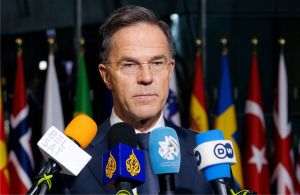Iran has requested a cooperation with Russia, India and China to counter NATO's military expansion plans in Europe, said Iranian Defense minister Hossein Dehghan, said yesterday in Moscow. "We would like to support the idea of developing a multilateral cooperation between China, Iran, Russia, India that would oppose NATO's deliberate expansion to the east and the placing of an antimissile shield in Europe", the Iranian official said, who emphasized that Iran is ready to begin consultations on the matter to ensure stability in the region.
The United states and NATO have often explained that the anti-missile elements installed in Europe are not directed at Russia, having the role of countering threats from countries that do not comply with international regulations, such as Iran.
"Non-nuclear powers that will host NATO anti-missile elements have become priority objectives for Russia's military reaction", Valery Gerasimov, head of the Major State Chief of the General Staff of the Armed Forces of Russia said, according to Wall Street Journal, explaining that the anti-ballistic systems which will be installed in Romania and Poland represent a threat to his country.
Also, Russian Foreign Affairs minister, Sergey Lavrov, said that the American anti-missile project in Europe is part of a global project that aims to destabilize the regional balance.
The Russian official also said that the American anti-missile defense program remains a grave threat.
Russian defense minister, Sergey Shoygu said the following at a security conference held in Moscow: "Our predictions concerning the global anti-missile defense system are coming true. We can confirm that the implementation of the American anti-missile defense architecture represents a threat to strategic stability". The Russian official has added that the NATO anti-missile shield continues to expand, despite the nuclear principle agreement between the major powers and Iran.
Shoygu said: "It is obvious that the threat of Iranian missiles, used as an excuse by the US and other NATO member countries, was a sham. In spite of substantial decisions in the negotiations on the issue of the Iranian nuclear project, no one has any illusions about the US' and NATO revision of the anti-missile plans. (...) NATO countries are actively trying to occupy geopolitical space, consistently increasing their military potential in Eastern Europe, close to Russia's borders".
Valery Gerasimov, Major State Chief of the General Staff of the Armed Forces of Russia, reminded that the number of NATO military exercises has doubled in the last year, nearing Russia's borders.
At the end of March, Russian ambassador in Denmark, Mikhail Vanin, was saying, according to Mediafax, that Russia would consider legitimate targets all the countries which will host NATO anti-ballistic installations. Romanian foreign minister, Bogdan Aurescu, explained at the time that NATO's antimissile system is purely defensive and has nothing to do with Russia.
The expansion of NATO's presence in Eastern Europe has caused concern for Russian authorities. The process occurs amid the tensions between the Alliance and Russia, following NATO's accusations that Russia provided military aid to the militias in South-Eastern Ukraine.
Moscow denied the accusations, whereas Russian deputy defense minister, Anatoly Antonov, said that NATO's activity in Eastern Europe was "unjustified".
In February, NATO announced the increase of its reaction force from 13,000 to 30,000 soldiers, as well as the establishing of six new command posts in European countries located near the Russian borders.
• GEORGE MAIOR, IN FT: "Russia is intensifying its cyberwar against the West"
Russia has intensified its cyberwar against the West, through cybernetic attacks and propaganda actions which target many countries, including Romania, says former SRI head George Maior, in an article published on the Financial Times blog, pleading for a new EU and NATO security strategy.
In the article, the former head of the Romanian Intelligence Service says: "As the revelations on cyberattacks launched in autumn last year against the US showed, Russia is engaged in an intense cyberwar against the West. Other targets of the Russian cybernetic attacks have included Germany, Estonia, Romania, Ukraine and Georgia. As James Clapper, head of the American intelligence services, was saying recently, in the US Senate, the Russian threat is «worse than initially estimated». Russian hackers' ability to access the IT networks of the State Department and the White House should raise red flags. The United States and NATO have to respond to these actions by developing more efficient systems to counter this threat.
(...) In Europe and in the Euro-Atlantic space, the Russian cyberoffensive is being conducted with increasing determination and sophistication. This is a modern and intelligent war, which goes beyond the traditional needs in terms of intelligence concerning the intentions of enemy states, which, from Vladimir's Putin point of view, is referring to any country that opposes his expansionist ambitions. (...)
The tactical objectives of the Russian cybernetic war varies depending on circumstances. Just like in the case of the cybernetic attacks that targeted the US last year, the similar actions fired against Romania and other NATO targets in 2013 were intended to allow access to classified information. The Romanian Intelligence Service was able to detect and block these attacks. (...) In other cases, the goal was propaganda. An attack against the German government websites, this year, was claimed by a group called CyberBerkut, being a response to Germany's support for Ukraine".
According to the former SRI director, Russia's cybernetic operations are just part of a "wider spectrum of active measures" against Western countries, which include "financing some political parties", "creating pro-Russian blogs and websites", "manipulation on the online networks" and "using influence agents". "All of these actions have the shared goal of countering Russia's alleged enemies, by propagating dissensions and misinformation", Maior says.
The former head of the SRI also says: "Despite the numerous cyberattacks against the US and Europe, Russia's main targets remain those situated closer to its borders. From this point of view, Putin's strategy is obvious: undermining and destabilizing the democratically elected governments in the neighboring countries, for the purpose of obtaining political and economic benefits and strategic influence. By generating internal support in these countries for Russia's policies, through the political and cultural elites and the media institutions, Putin hopes to rebuild a European area of influence and to exercise total control in decisions of strategic importance for Russia. These tactics, just like the actual cyberwar, are not new, but their use has now reached a level of intensity that has never been seen since the peak of the Cold War".
George Maior also says that it is time for Europe and NATO to move to more serious measures to counter Russia's measures: "This situation can not go on anymore. It is time for Europe and NATO and to move to firmer actions. A cohesive and robust reaction to Russia's tacit war is needed, by countering and neutralizing Russia's espionage actions in the member states. This requires more political will, as well as supplemental resources and more effective instruments - including appropriate legal ways to protect security and freedoms in Europe. The Romanian Intelligence Service is already playing an active role in countering this threat, by offering aid to regional allies such as Ukraine, towards modernizing its cybernetic capabilities and to monitor the Russian infiltrations in essential sectors of activity".























































